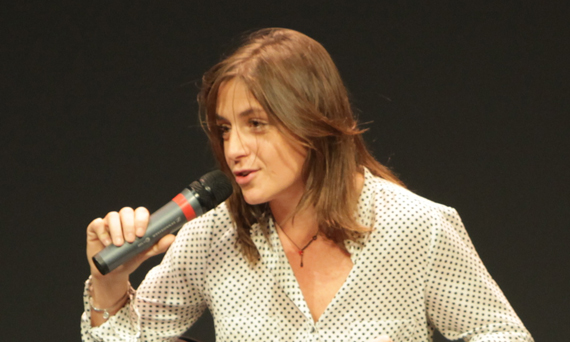Florence Gastaud • Managing director of ARP
"We must put an end to the parochial quarrels"
- Florence Gastaud, managing director of ARP, organising the Dijon Encounters, deciphers the debate on media chronology

Fuelled by the arrival in France of Netflix and by numerous reports, the debate on media chronology (the regulated order of different motion picture uses: cinema, VoD, pay-TV, free-TV, SVoD) has been slow to produce results. Focus with Florence Gastaud, managing director of ARP (the civil society of Authors-Directors-Producers), on the eve of the 24th Dijon Cinema Encounters (from 16 to 18 October).
Cineuropa: Media chronology is the subject of very heated debates in France. What’s your opinion?
Florence Gastaud: Those who finance films certainly have to preserve their windows, but you also need to be creative in order to find new financiers. For the first window, as a filmmakers’ organisation, we will never be told that a movie is not suited to the theatre. But there are films that don’t reach the audience; they’re too fragile to take on the theatre and they then almost block the VoD market. When we talk about "day-and-date", we don’t want to slight movie-theatres, otherwise we would plead for direct VoD. There are films that could pool their marketing and expand their audiences by playing on these two windows. For this type of film we suggest that by defining criteria (for example the number of copies), one could submit them to a derogation board before their release. The distributor would present their release plan and the board (which would be made up of operators), could assess if the film is fragile, but if it nevertheless has the capacity to take on theatres in France. Perhaps we’re mistaken, but we believe that attempts must be made to facilitate better screening of films. The example of Curzon in England, about art house and experimental cinema, is nonetheless fascinating, and that does not prevent them from continuing to build theatres.
Could cooperation between professionals get bogged down in the status quo?
That’s kind of my worry. The National Federation of French Cinemas (FNCF) and even AFCAE (art house & experimental cinema) are very against this type of thing. But when you speak to individuals, many operators express their curiosity and, above all, the fact that we must do it ourselves before others brutally force it upon us via the market. Producer organisations are quite divided. Filmmaker organisations like the SRF (French Directors’ Guild) are becoming very sensitive to these issues because directors want their films to be seen. We are well aware that the power relationship is complex as we’ve seen the resilience shown by operators when they don’t wish for something to occur. But we want to work with them and it would be absurd to not allow those who are curious to have a try.
What’s the stance of TV stations?
On the first window, although they’re less concerned and not to go so far as to say in favour of it, some would be curious about "day-and-date" film releases. But the team dynamic means that if some don’t express their agreement with a change, the others won’t either when it comes to other windows, like sliding windows or SVoD. So there may be an unwritten agreement whereby nothing changes. We would be disappointed with that, because we’re not talking about correcting effects,but about rethinking how we screen movies. We must put an end to the parochial quarrels. Because we cannot forget that almost one in every two films in France doesn’t have TV station financing. In an ideal world, the new SVoD actors could come in where others no longer want to or have the means to approach this type of film. These films could thus obtain somewhat little financing, and the SVoD services could develop with exclusive works which would by definition be diverse. If they had an advanced chronology, they would be more interested in these films. Obviously, today, the big issue with SVoD is the impairment loss: with subscriptions from 7 to 10 euro, we’re a long way from the 40 euro Canal+ subscriptions, so we need to know to what extent we can guarantee a long-lasting and sustainable level of movie financing. But we must present arguments to SVoD services so that they develop and have the means to back films.
(Translated from French)
Did you enjoy reading this article? Please subscribe to our newsletter to receive more stories like this directly in your inbox.
















